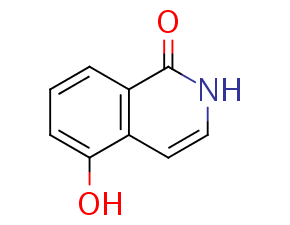
1,5-Isoquinolinediol
CAS No. 5154-02-9
1,5-Isoquinolinediol ( —— )
产品货号. M17727 CAS No. 5154-02-9
1, 5-Isoquinolinediol 是聚(ADP-核糖)合成酶(PARP1;IC50:0.39 μM)的抑制剂。
纯度: >98% (HPLC)
 COA
COA
 Datasheet
Datasheet
 HNMR
HNMR
 HPLC
HPLC
 MSDS
MSDS
 Handing Instructions
Handing Instructions
| 规格 | 价格/人民币 | 库存 | 数量 |
| 5MG | ¥470 | 有现货 |


|
| 10MG | ¥705 | 有现货 |


|
| 50MG | ¥1547 | 有现货 |


|
| 100MG | 获取报价 | 有现货 |


|
| 200MG | 获取报价 | 有现货 |


|
| 500MG | 获取报价 | 有现货 |


|
| 1G | 获取报价 | 有现货 |


|
生物学信息
-
产品名称1,5-Isoquinolinediol
-
注意事项本公司产品仅用于科研实验,不得用于人体或动物的临床与诊断
-
产品简述1, 5-Isoquinolinediol 是聚(ADP-核糖)合成酶(PARP1;IC50:0.39 μM)的抑制剂。
-
产品描述1, 5-Isoquinolinediol is an inhibitor of poly(ADP-ribose) synthetase (PARP1; IC50: 0.39 μM). The poly(ADP-ribose) polymerases (PARPs) form a family of enzymes with roles in DNA repair and apoptosis. 1, 5-Isoquinolinediol has been used to study the role of PARP1 in both DNA repair and oxidant stress-induced cell death. This compound can be used with cells in culture and in animals.
-
体外实验1,5-isoquinolinediol leads to an increase up to 8-fold in the absolute frequency of gene targeting in the correction of the mutation at the stable integrated HSV tk gene.1,5-Isoquinolinediol is a potent PARP antagonist and decreases cleaved PARP in diabetic retina.1,5-Isoquinolinediol (500 μM H2O2; 24 hours) attenuates H2O2-induced upregulation of cleaved PARP-1 expression in retinal Muller cells. 1,5-Isoquinolinediol attenuates diabetes-induced upregulation of retinal nitrated protein expression. 1,5-Isoquinolinediol attenuates diabetes-induced activation of NADPH oxidase in the retina.
-
体内实验——
-
同义词——
-
通路Others
-
靶点Other Targets
-
受体PARP1
-
研究领域——
-
适应症——
化学信息
-
CAS Number5154-02-9
-
分子量161.16
-
分子式C9H7NO2
-
纯度>98% (HPLC)
-
溶解度In Vitro:?DMSO : 37.04 mg/mL (229.83 mM)
-
SMILESOc1cccc2c1cc[nH]c2=O
-
化学全称——
运输与储存
-
储存条件(-20℃)
-
运输条件With Ice Pack
-
稳定性≥ 2 years
参考文献
1. Davar D, et al. Role of PARP inhibitors in cancer biology and therapy.[J]. Current Medicinal Chemistry, 2012, 19(23).
产品手册




关联产品
-
Isosilybin B
Isosilybin B is a flavonolignan extracted from silymarin that exhibits anti-prostate cancer (PCA) activity, inhibits cancer cell proliferation, and contributes to G1-phase blockade and apoptosis.Isosilybin B induces degradation of the androgen receptor.
-
CB-839
CB-839 (Telalenastat) 是一种有效的、选择性的、口服生物可利用的谷氨酰胺酶抑制剂,对肾脏和大脑(GAC 和 KGA)中谷氨酰胺酶的 IC50 分别为 28 和 23 nM。
-
LSKL(a)
LSKL,血小板反应蛋白 (TSP-1) 抑制剂是一种源自潜伏相关肽的肽,可抑制 TGF-β 的血小板反应蛋白 (TSP-1) 激活。



 021-51111890
021-51111890 购物车()
购物车()
 sales@molnova.cn
sales@molnova.cn







